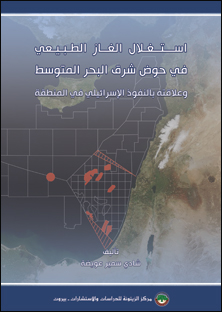Reviewed by: Fatima ‘Itani.
Al-Zaytouna Centre has published a new book entitled, “Natural Gas Exploitation in the Eastern Mediterranean Basin and its Impact on the Israeli Influence in the Region,” by Shadi Samir Ewida.
The 222-page book clarifies the Israeli conduct, attitudes, policies and changes concerning the new gas discoveries in the eastern Mediterranean, and how to exploit them economically, within the policy of creating facts on the ground.
This book was originally a Master’s thesis of five chapters, where chapter one introduced the general framework; chapter two presented the Israeli capabilities to exploit the gas fields in the eastern Mediterranean; chapter three discussed the discovery of gas in the eastern Mediterranean and the prospects of influence vs. “cooperation”; chapter four studied the impact of these discoveries on Israeli influence on the regional countries; and chapter five focused on the future of Israeli influence on regional states in light of the new gas discoveries in the eastern Mediterranean. At the end, there is a conclusion and appendices.
Publication Information Arabic -Title: Istighlal al-Ghaz al-Tabi‘i fi Hawd al-Sharq al-Bahr al-Mutawassit wa ‘Alakatuh bi al-Nufuz al-Israili fi al-Mintaqa (Natural Gas Exploitation in the Eastern Mediterranean Basin and its Impact on the Israeli Influence in the Region). – Prepared by: Shadi Samir Ewida |
 |
Despite the abundance of theoretical studies that address the discoveries and exploitation of gas, and its impact on the Israeli influence in the region, there are only limited articles that combine the two topics. Even the topics that were discussed in previous studies did not proceed from a theoretical political, economic and legal framework, which would limit the shortcomings in them. Rather these western articles tried to justify Israeli domination of the gas fields. Therefore, this study lays the first block of such studies in order to fill this gap in Arab political literature.
Since 2009, the series of the major gas discoveries in the eastern Mediterranean have changed the conflict dynamics in that region. Israel’s discovery of Tamar, Dalit and Leviathan gas fields granted it a regional role in the gas market. In spite of the facts that these discoveries carry with them new goals in marine or land areas, they certainly double the elements of conflict between the Arab countries and Israel.
These new discoveries have serious economic, financial, strategic and geopolitical implications. For gas may become an important pillar of the economy of the Arab countries, and in return, it may give Israel the chance to increase its prominence at the expense and detriment of the Arab balance of power.
The study mentions that these discoveries should provide the Palestinians, Egyptians, Lebanese, Cypriots, Turks, and the European Union, a grand opportunity to put pressure on Israel. For there is an increasing international demand for the right of Palestinians to exploit their natural resources, which the United Nations has approved, like all other peoples of the world.
The study focused on the most important regional implications of these discoveries, such as the economic, financial and political implications on Israel, its status and strategic influence in the region; the implications on the Lebanese-Israeli dispute over the maritime borders, the Arab-Israeli conflict in general, and the Turkish-Cypriot dispute, in particular, which led to a political, economic and military rapprochement between Israel, Cyprus and Greece. This rapprochement resulted in a summit held in Nicosia in 2016, where the heads of the three states convened to establish a new geopolitical entity in the eastern Mediterranean. This convergence is also poised to become a new strategic axis that includes these countries, who have among their undeclared goals, the goal to confront Turkey and strengthen Israeli influence in the region.
On a different note, the study mentions that the discoveries brought about significant development opportunities to the countries of this region. It also studies the relation between exploration, exploitation and production of energy on one hand, and the maritime security in the eastern Mediterranean on the other hand. Each country will seek to secure its interests of marine energy, and define their exclusive economic zones, hence they will endeavor to increase the number of warships and helicopters in the eastern Mediterranean to guarantee their energy security, which has imposed itself on the national security equation of the region.
Israel and the concerned companies will provide energy, and export it primarily to neighboring countries. Israel’s real problem is in the enhancement of the maritime presence of the three countries (Cyprus, Greece and Turkey), in addition to Russia that already has its fleet in the eastern Mediterranean; thus forcing Israel to strengthen its naval reinforcements in order to protect its energy infrastructure and meet any potential risk. However, these risks should not be overstated, since they seem limited in comparison to the Arab-Israeli conflict that already historically exists in the Middle East.
In addition to the above, Israel seeks to make the gas discoveries a gateway to normalization with the countries of the region, hence securing its political stability with its Arab surrounding and consequently having its own energy security, especially in southern Lebanon. It would also stabilize the conditions in Egypt, Jordan and the Palestinian Authority territories, in accordance with Israeli standards, which would also secure the potential Israeli gas exports. At the same time, the fight over property may lead to escalating tensions between Turkey and Cyprus, and between Lebanon and Israel, which would affect the security and stability of the region.
The study suggests that Egypt holds the keys to the future of gas in the eastern Mediterranean, as the country is in possession of the Zohr gas field, currently the largest gas field in the entire Mediterranean. Israel will build the largest and most advanced marine fleet in the eastern Mediterranean, in order to further protect its newly discovered gas fields.
In light of the above, this study then proposes the following recommendations:
1. The international community should strive to resolve the Arab-Israeli conflict, which may ease tension between the countries of the Levant Basin and lead to greater cooperation between them.
2. The maritime boundary must be determined and agreed upon. Therefore, experts in diplomatic and military affairs should be involved in helping Lebanon and Israel successfully identify their economic zones and avoid conflict.









Leave A Comment